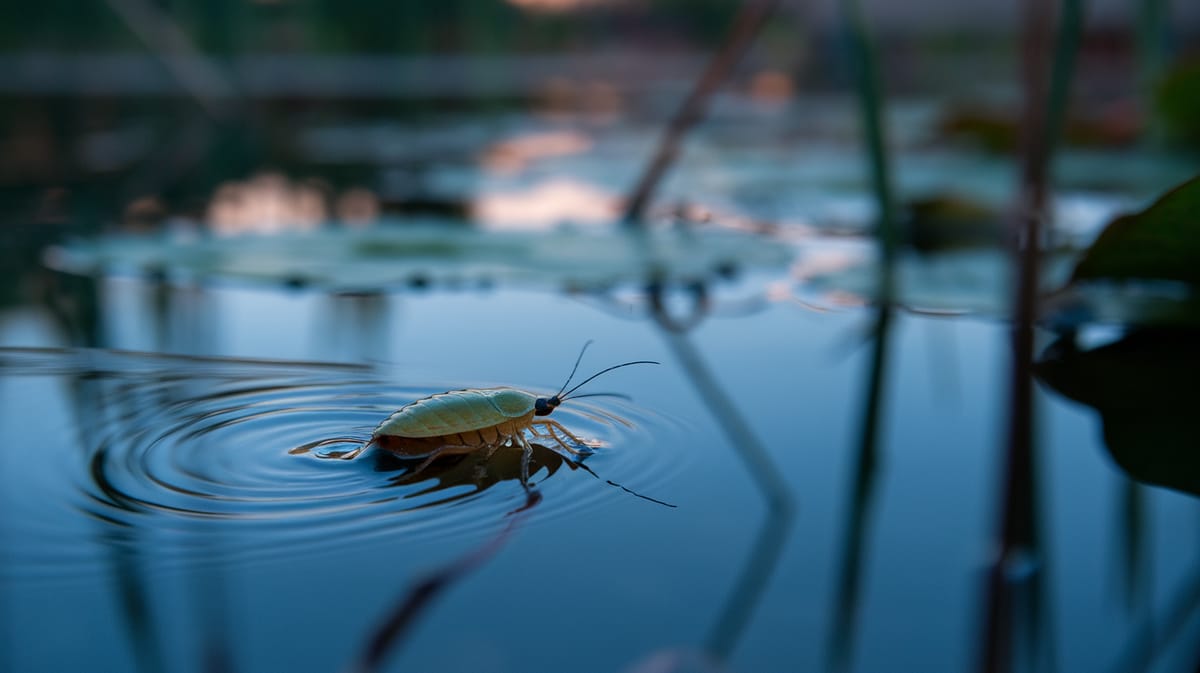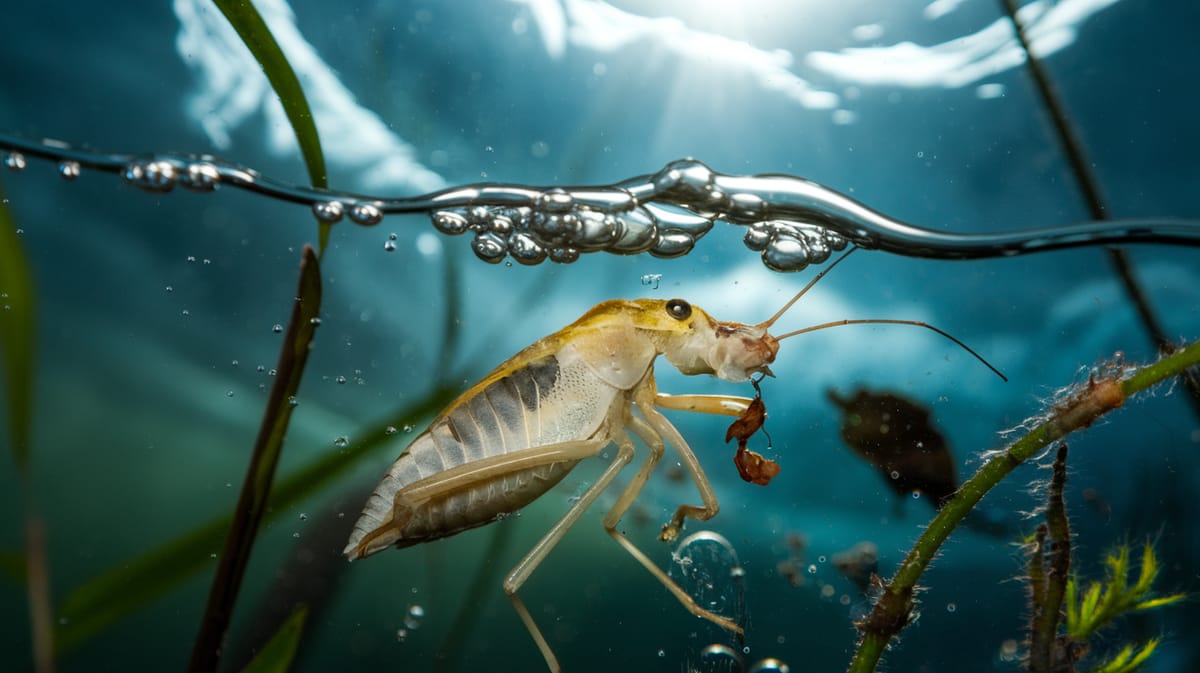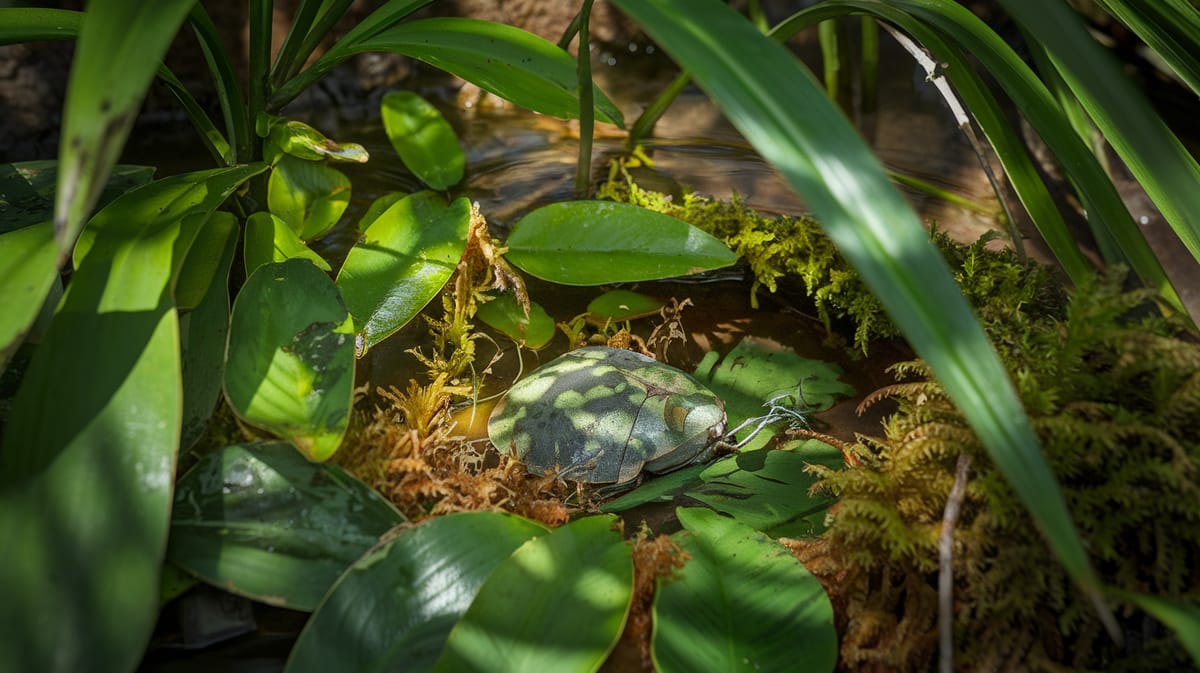Water Bug
Agile predator of ponds and streams, the Water Bug thrives on its remarkable swimming skills and fierce hunting tactics. Vital to aquatic ecosystems, it controls insect populations.

Key Insights at a Glance
Did You Know?
Taxonomy & Classification
Water bugs, known for their formidable size and predatory prowess, exhibit unique adaptations like retractable breathing tubes and powerful forelegs, making them efficient aquatic hunters. Let's understand the evolutionary journey and classification of these remarkable predators.
Species Diversity
The genus Lethocerus includes about 20 species, primarily found in tropical and subtropical regions, showcasing adaptability to diverse aquatic environments.
Survival Adaptations
Evolving around 200 million years ago, water bugs have adapted to freshwater habitats, surviving through significant climatic and geological shifts.
Lifecycle and Growth
A remarkable journey of transformation from Egg to Adult.
Egg
Eggs are laid on aquatic vegetation or floating debris, starting their life encapsulated with protection against predators.
Nymph
Nymphs resemble small adults and grow through five molts, gradually developing wings and body features.
Adult
Adults are skilled swimmers and predators, using their piercing mouthparts to capture prey in aquatic habitats.
Dietary Habits
A skilled predator with remarkable hunting abilities, this insect's diet includes aquatic insects, small fish, and opportunistic prey.
| DIET TYPE | DESCRIPTION |
|---|---|
| Primary Diet | Primarily feeds on aquatic insects and small fish, utilizing its piercing mouthparts for efficient capture. |
| Secondary Diet | Targets tadpoles and young amphibians when these are abundant in its aquatic environment. |
| Occasional | Occasionally consumes small crustaceans and other aquatic organisms, adapting to available resources. |

Behaviour and Adaptations
Discover the fascinating adaptations that enable the Water Bug to thrive in aquatic environments.
Aquatic Ambush
Skilled at lurking beneath the water surface to surprise unsuspecting prey.
Powerful Front Legs
Equipped with strong, raptorial front legs to grasp and subdue prey.
Underwater Respiration
Utilizes a specialized breathing tube to siphon air from the surface.
Ecosystem Impact
Water Bugs play a crucial role in sustaining aquatic ecosystems.
Natural Predator
Controls mosquito populations by preying on larvae in water bodies.
Nutrient Recycler
Decomposes organic matter, enhancing nutrient cycling in aquatic habitats.
Food Chain Support
Serves as prey for fish and amphibians, maintaining the aquatic food web balance.
Conservation Challenges
Understanding and addressing the major threats to Water Bug populations.
Habitat Destruction
Urban development and agriculture reduce water bug habitats significantly.
Pollution
Water contamination from chemicals and waste threatens water bug survival.
Climate Change
Altered rainfall patterns and temperatures impact water bug ecosystems.
Frequently Asked Questions
How long do Water Bug live?
Water Bugs generally live for one to two years. Their lifespan can vary depending on environmental factors and availability of food. They go through several stages, including egg, nymph, and adult, during their life cycle.
What do Water Bug eat?
Water Bugs are carnivorous and primarily feed on other insects, small fish, and amphibians. They use their front legs to capture prey and have a piercing mouthpart to inject enzymes and suck out the liquefied insides.
Are Water Bug poisonous?
Water Bugs are not poisonous, but they can deliver a painful bite if handled improperly. Their bite is not dangerous to humans but can cause temporary pain and swelling. They use their bite to subdue prey.
Are Water Bug endangered?
Water Bugs are not currently classified as endangered. They are widely distributed in various freshwater habitats around the world. However, habitat destruction and pollution can impact local populations.
What do Water Bug symbolize?
Water Bugs often symbolize adaptability and survival due to their ability to thrive in various aquatic environments. In some cultures, they may also represent resilience and resourcefulness.
Do Water Bug bite?
Yes, Water Bugs can bite if threatened or handled. Their bite can be painful but is not harmful to humans. They primarily use their bite to capture and subdue prey.
What color are Water Bug?
Water Bugs typically have a brown to black coloration, which helps them blend into their aquatic environments. This camouflage aids in both hunting and avoiding predators.
Does a Water Bug have wings?
Yes, Water Bugs have wings. They possess two pairs of wings, allowing them to fly short distances. While they are primarily aquatic insects, their wings enable them to move to new habitats if necessary.
What does a Water Bug look like?
Water Bugs are large, flat, oval-shaped insects with a distinctive pair of front legs adapted for grasping prey. They have a brown or black body, long antennae, and prominent eyes, making them well-suited for life in water.
Is a Water Bug an insect?
Yes, Water Bugs are insects. They belong to the order Hemiptera, which includes true bugs. Like other insects, they have three body segments (head, thorax, abdomen), six legs, and two antennae.
Related Insects
Discover insects with similar characteristics to Water Bug - including shared habitats, diets, and taxonomic classifications
Share this profile
Help others discover Water Bug
